Ariel Gordon's Blog, page 11
March 20, 2016
National Poetry Month in the Winnipeg Free Press!
Starting April 4, The Winnipeg Free Press will be publishing poems on their website as part of a National Poetry Month project edited by Ariel Gordon.
Poems by Manitoba writers will be posted to the WFP website every weekday in April. WFP staff will be taking portraits of poets and recording audio of the poets reciting their work, both of which will run alongside the poems.
Eligible poets: All Manitoba poets, which includes urban and rural Manitobans as well as former Manitobans. I'm committed to a diversity of voices: emerging, PoC, spoken word, Indigenous, established, and page poets.
Details: Email your poems to poetrymonthwfp@gmail.com. Send 3-5 poems, with each poem being no longer than 30 lines. As is this an unpaid gig, previously published (i.e. in magazines or book form) is fine. The deadline is March 23.
About the Editor: Ariel Gordon is a Winnipeg writer. Her second collection of poetry, Stowaways, won the 2015 Lansdowne Prize for Poetry at the Manitoba Book Awards. Most recently, she’s working on essays about Winnipeg’s urban forest. In addition to her English and creative writing training, Ariel also has a Bachelor of Journalism and works as Promotions Coordinator at University of Manitoba Press.
Poems by Manitoba writers will be posted to the WFP website every weekday in April. WFP staff will be taking portraits of poets and recording audio of the poets reciting their work, both of which will run alongside the poems.
Eligible poets: All Manitoba poets, which includes urban and rural Manitobans as well as former Manitobans. I'm committed to a diversity of voices: emerging, PoC, spoken word, Indigenous, established, and page poets.
Details: Email your poems to poetrymonthwfp@gmail.com. Send 3-5 poems, with each poem being no longer than 30 lines. As is this an unpaid gig, previously published (i.e. in magazines or book form) is fine. The deadline is March 23.
About the Editor: Ariel Gordon is a Winnipeg writer. Her second collection of poetry, Stowaways, won the 2015 Lansdowne Prize for Poetry at the Manitoba Book Awards. Most recently, she’s working on essays about Winnipeg’s urban forest. In addition to her English and creative writing training, Ariel also has a Bachelor of Journalism and works as Promotions Coordinator at University of Manitoba Press.
Published on March 20, 2016 21:29
March 13, 2016
Out-of-Town-Writers: Yann Martel
Winnipeg Free Press—PRINT EDITION
By Ariel Gordon
Born in Spain to Québécois parents, Yann Martel has lived in Iran, Turkey and India, but now calls Saskatoon home.
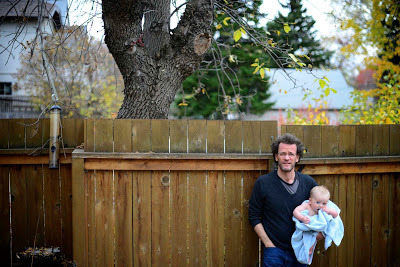 His published works include a collection of short stories, another of letters to former prime minister Stephen Harper, and four novels, including Life of Pi, which won the Man Booker Prize for Fiction and was adapted for the screen by director Ang Lee.
His published works include a collection of short stories, another of letters to former prime minister Stephen Harper, and four novels, including Life of Pi, which won the Man Booker Prize for Fiction and was adapted for the screen by director Ang Lee.
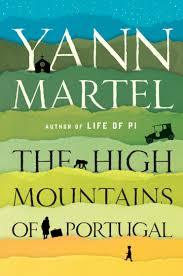
Martel will be in Winnipeg March 14, launching his latest book, The High Mountains of Portugal, at McNally Robinson Booksellers. He took the time to speak to Ariel Gordon.
Free Press: What do you want people to know about this book?
Yann Martel: That it’s a novel, that it features animals and cars and dead bodies and magical mountains.
FP: As a writer (i.e. someone whose artistic practice is predicated on time spent alone) how do you approach readings? What do you get out of them?
YM: As much as I love the illuminated solitude of creation, I also love going on tour to talk about my books. Art is a gift, a social act. I find connecting with readers (and journalists) very stimulating, whether they like my books or not. That’s important to note: it’s not about being patted on the back, it’s about dialogue.
I don’t actually do readings very often, I prefer just to talk about my book. People can read the book for themselves if they want to. What they can’t get so easily is the author talking about his book. So I approach my events in no special way, I just let things happen, the way we don’t prepare when we are going to meet a friend. Discourse will find its natural course.
As for what I get out of it, I get what one gets out of dialoguing: a sense of connection, of binding myself with others into a community.
FP: The High Mountains of Portugal is your sixth book since The Facts Behind the Helsinki Roccamatios was published in 1993. What are your goals for your writing now, as compared to your first books? As compared to the international acclaim of Life of Pi?
YM: With each book that I write, I’m trying to understand something, some aspect of the human condition. So with Helsinki, I was trying to understand the nature of stories, how we build them, why we tell them.
With Self, in which a character spontaneously changes sex twice, boy to girl to boy, I was looking into the nature of gender and sexual orientation.
With Life of Pi, I was curious about faith. What is it? How does it work? What does it mean to have faith?
With Beatrice & Virgil, I wanted to apply the tools of fiction on an event that has resisted fictionalization, unlike every other historical event, including war, slavery, disease... that even being the Holocaust.
And now, with The High Mountains of Portugal, I wanted to look at the tools we have at our disposal to deal with suffering. That use of curiosity as my guiding light will not change, I don’t think. Already I have another novel in mind. The idea popped into my head barely a week ago, while I was in Amsterdam. Anger—what is it? Why are we prone to anger, the way animals are not? What are the workings of anger, its consequences, etcetera? Those questions are already leading me on a narrative chase.
FP: This novel is about loving and losing love, about leaving home and what it means to be human, but it hinges on the particular sorrow of losing children. Was that particularly difficult to write, as the father of four children?
YM: Not really. The death of a child is the foundational myth of Western civilization, God so loved us that he gave up his son. Clearly, no death goes deeper in its impact than that of a child. Being the father of four, I can see that. But I wasn’t projecting any personal fear of that. I’m not a fearful father (or man, for that matter). At most, I placed my potential sorrow within that inscribed at the heart of the Jesus event.
FP: Speaking of which, how has having a young family changed your life, and, by extension, your process?
YM: I’m a busier, more sleep-deprived writer, constantly side-swiped by noisy intrusions of joy. It’s a good life. My writing process, in all that, is conducted much the same way as before when I manage to close the door on my gaggle of children. The quiet joy of creation is just more obviously hemmed in by the shrieking joy of the created.
FP: What influence have your Québécois parents—a literary translator and a diplomat-poet—had on your writing?
YM: Their influence was foundational. If I started reading, it’s because they read. If I started writing, it’s because my father wrote. (Émile Martel won the Governor General’s Award for French-language poetry in 1995.) If I continued writing, it’s because my parents encouraged and validated what I did.
Being diplomats, they also showed me the world, which is another book.
As for writing in French, I do so privately, to my parents mostly. I went to school in English. English is the language in which I assert myself with the greatest clarity.
FP: For four years, you sent former prime minister Stephen Harper a book every two weeks. Have you sent Justin Trudeau anything yet or is that a wait-and-see proposition?
YM: Justin Trudeau obtained a Bachelor’s degree in English literature. And he taught drama at a school. He has read books, understands what the artful word can bring to the soul. I see in him a man more opened up by literature than Stephen Harper ever was. And perhaps by nature he is more open-minded to start with, hence his openness to literature.
Now, how he will fare in office is another question. I believe that leaders must read artful books. How else can they understand the human condition? How else can they reach out to the Other.
But that doesn’t guarantee in itself political success. Look at Michael Ignatieff and his disastrous turn as leader of the Liberal Party. The wealth of literature is a necessary condition, I think, but certainly not the only one.
FP: What are you reading right now? What are you writing right now?
YM: I’m reading The Iliad, speaking of anger and its consequences. I’m writing nothing, nothing at all. Each time I finish a book, I’m spent. I may think about writing another book, but the idea of actually sitting down and doing so exhausts me. I’ll take a few months off before I actually put on that yoke again.
Ariel Gordon is a Winnipeg writer.
By Ariel Gordon
Born in Spain to Québécois parents, Yann Martel has lived in Iran, Turkey and India, but now calls Saskatoon home.
 His published works include a collection of short stories, another of letters to former prime minister Stephen Harper, and four novels, including Life of Pi, which won the Man Booker Prize for Fiction and was adapted for the screen by director Ang Lee.
His published works include a collection of short stories, another of letters to former prime minister Stephen Harper, and four novels, including Life of Pi, which won the Man Booker Prize for Fiction and was adapted for the screen by director Ang Lee.
Martel will be in Winnipeg March 14, launching his latest book, The High Mountains of Portugal, at McNally Robinson Booksellers. He took the time to speak to Ariel Gordon.
Free Press: What do you want people to know about this book?
Yann Martel: That it’s a novel, that it features animals and cars and dead bodies and magical mountains.
FP: As a writer (i.e. someone whose artistic practice is predicated on time spent alone) how do you approach readings? What do you get out of them?
YM: As much as I love the illuminated solitude of creation, I also love going on tour to talk about my books. Art is a gift, a social act. I find connecting with readers (and journalists) very stimulating, whether they like my books or not. That’s important to note: it’s not about being patted on the back, it’s about dialogue.
I don’t actually do readings very often, I prefer just to talk about my book. People can read the book for themselves if they want to. What they can’t get so easily is the author talking about his book. So I approach my events in no special way, I just let things happen, the way we don’t prepare when we are going to meet a friend. Discourse will find its natural course.
As for what I get out of it, I get what one gets out of dialoguing: a sense of connection, of binding myself with others into a community.
FP: The High Mountains of Portugal is your sixth book since The Facts Behind the Helsinki Roccamatios was published in 1993. What are your goals for your writing now, as compared to your first books? As compared to the international acclaim of Life of Pi?
YM: With each book that I write, I’m trying to understand something, some aspect of the human condition. So with Helsinki, I was trying to understand the nature of stories, how we build them, why we tell them.
With Self, in which a character spontaneously changes sex twice, boy to girl to boy, I was looking into the nature of gender and sexual orientation.
With Life of Pi, I was curious about faith. What is it? How does it work? What does it mean to have faith?
With Beatrice & Virgil, I wanted to apply the tools of fiction on an event that has resisted fictionalization, unlike every other historical event, including war, slavery, disease... that even being the Holocaust.
And now, with The High Mountains of Portugal, I wanted to look at the tools we have at our disposal to deal with suffering. That use of curiosity as my guiding light will not change, I don’t think. Already I have another novel in mind. The idea popped into my head barely a week ago, while I was in Amsterdam. Anger—what is it? Why are we prone to anger, the way animals are not? What are the workings of anger, its consequences, etcetera? Those questions are already leading me on a narrative chase.
FP: This novel is about loving and losing love, about leaving home and what it means to be human, but it hinges on the particular sorrow of losing children. Was that particularly difficult to write, as the father of four children?
YM: Not really. The death of a child is the foundational myth of Western civilization, God so loved us that he gave up his son. Clearly, no death goes deeper in its impact than that of a child. Being the father of four, I can see that. But I wasn’t projecting any personal fear of that. I’m not a fearful father (or man, for that matter). At most, I placed my potential sorrow within that inscribed at the heart of the Jesus event.
FP: Speaking of which, how has having a young family changed your life, and, by extension, your process?
YM: I’m a busier, more sleep-deprived writer, constantly side-swiped by noisy intrusions of joy. It’s a good life. My writing process, in all that, is conducted much the same way as before when I manage to close the door on my gaggle of children. The quiet joy of creation is just more obviously hemmed in by the shrieking joy of the created.
FP: What influence have your Québécois parents—a literary translator and a diplomat-poet—had on your writing?
YM: Their influence was foundational. If I started reading, it’s because they read. If I started writing, it’s because my father wrote. (Émile Martel won the Governor General’s Award for French-language poetry in 1995.) If I continued writing, it’s because my parents encouraged and validated what I did.
Being diplomats, they also showed me the world, which is another book.
As for writing in French, I do so privately, to my parents mostly. I went to school in English. English is the language in which I assert myself with the greatest clarity.
FP: For four years, you sent former prime minister Stephen Harper a book every two weeks. Have you sent Justin Trudeau anything yet or is that a wait-and-see proposition?
YM: Justin Trudeau obtained a Bachelor’s degree in English literature. And he taught drama at a school. He has read books, understands what the artful word can bring to the soul. I see in him a man more opened up by literature than Stephen Harper ever was. And perhaps by nature he is more open-minded to start with, hence his openness to literature.
Now, how he will fare in office is another question. I believe that leaders must read artful books. How else can they understand the human condition? How else can they reach out to the Other.
But that doesn’t guarantee in itself political success. Look at Michael Ignatieff and his disastrous turn as leader of the Liberal Party. The wealth of literature is a necessary condition, I think, but certainly not the only one.
FP: What are you reading right now? What are you writing right now?
YM: I’m reading The Iliad, speaking of anger and its consequences. I’m writing nothing, nothing at all. Each time I finish a book, I’m spent. I may think about writing another book, but the idea of actually sitting down and doing so exhausts me. I’ll take a few months off before I actually put on that yoke again.
Ariel Gordon is a Winnipeg writer.
Published on March 13, 2016 10:24
March 9, 2016
Poetry in Voice 2016

* * *
So I'll be an Online Semifinal Judge again this year for Poetry in Voice: A Recitation Contest for Canadian High Schools.
There are nine poet-judges this year, including Gillian Jerome, Pierre Nepveu, Michael Crummey,
Joanna Lilley, Deanna Young, Andrée Lacelle, Liz Howard, and Éric Charlebois.
Poetry in Voice coincides with the Concour D'art Oratoire competition at my daughter's French Immersion school, so I've been thinking about what it means to get up in front of people.
In particular, I'm remembering when I did my own Concour D'art Oratoire presentations and my first poetry readings. I'd blush and stammer and run out of air...
So I have a lot of appreciation for the French Immersion elementary school kids who've spent the last few weeks memorizing speeches (my daughter's is about our cat) and all the high school students who've gotten poems off-book...
Published on March 09, 2016 10:25
March 6, 2016
Reprint: Gory

* * *
So my poem "Gory"—my period poem, my menstruation glosa— is ALSO in the 10th anniversary issue of The Goose, a critical/creative web journal published by the Association for Literature, Environment, and Culture in Canada (or ALECC).
The poem glosses “Seas” by Erin Robinsong, which appeared in Vol. 13, Issue 2 of The Goose.
Here's what poetry editor Camilla Nelson had to say about the poem:
"In “Gory,” Robinsong’s work inspires Ariel Gordon to address the sea of blood through, by and from which we all—not just the “leaky collection of wives & daughters” she initially references—travel."
There's lots of great work in this issue, including poems by Jenna Butler, Gary Barwin, Basma Kavanagh, Don McKay, Ken Belford, and gillian harding-russell.
Thanks to Camilla and to The Goose editors for including me!
Published on March 06, 2016 09:39
March 5, 2016
February: 95 books
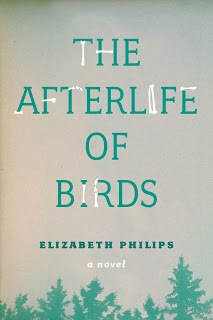 So February was not a great month, finishing of books-wise...
So February was not a great month, finishing of books-wise...But I got lots of writing done, did some community organizing, and went out with friends. Live music even!
(I miss live music...)
19. Calamity Jack—Shannon and Dean Hale, illus. by Nathan Hale.
18. The Afterlife of Birds—Elizabeth Philips.
17. Mouseheart—Lisa Fiedler. Beca
use my daughter asked me to.
16. The High Mountains of Portugal—Yann Martel.
Published on March 05, 2016 00:20
March 4, 2016
Reprint: Hilarity, Wit and Tenderness
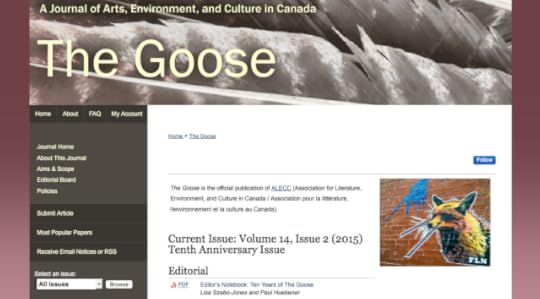
* * *
So Regina poet Gillian Harding-Russell reviewed Stowaways for the 10th anniversary issue of The Goose, which is the creative/critical journal run by ALECC (Association for Literature, Environment, and Culture in Canada).
Harding-Russell's review opens with the following:
"In Stowaways, Ariel Gordon reflects a feminist and often a mother's perspective in which zany metaphor and unusual collage are poised to startle and challenge the reader. And if this imagery and meaning brought about through juxtaposition are not enough to disrupt the reader's ordinary
senses, surreal angles and surprise turns are guaranteed to dislocate sensibility and overturn old ways of seeing. At the heart of Gordon's postmodern view, comedy and cleverness and an intrinsically parodic inventiveness reign, as witness the slew of 'how to' survive poems that make up the
last half of the collection."
It should go without saying that any poet appreciates close readings of her work. But in this case, I deeply appreciate that it was Harding-Russell, a senior female poet from the prairies, who provided that close reading. She seems to have 'gotten' many of my aims and efforts, which is always nifty...
You can read the rest of the review here and, if you'd also like to read reviews of books by my Palimpsest pressmates Yvonne Blomer, Patricia Young, and Ruth Roach Pierson, they're also reviewed in this issue.
Published on March 04, 2016 13:53
February 28, 2016
Buncha Women
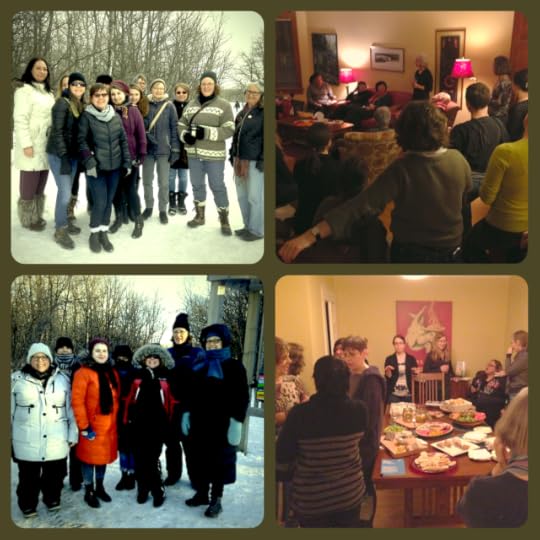
* * *
I'm not much of a joiner, but I believe in community and I believe in women.
And there were women around me who needed help building community for themselves and consolation through the rough months of January and February. (The weather! The onslaught of work! That trial!)
So, over the past few weeks, I've taken two groups of women for walks in Assiniboine Forest as well as a few individuals. I've also helped to organize a salon for women writers with Erna Buffie, a filmmaker and novelist.
I wasn't sure I would like walking in the woods with a group of people. I usually go to Assiniboine Forest by myself or with M and part of what I'm after is the intimate quiet of the woods.
But walking with a bunch of excellent women was great. It felt celebratory, as duos and trios formed, broke up, and reformed. People talked to people they knew and people they didn't know. I talked a bit about trees, pointed out mushrooms and witches' brooms and galls, and took them into clearings and onto a frozen pond.
On the first walk, I followed the route that M and I usually walk, which is to say our default route. On the second walk, I deliberately followed a random route, asking different women which way we should go. Most of the time, I knew where we were, but I wasn't worried about getting lost, not with the forest being so neatly boxed by Grant and Wilkes, Shaftsbury and Chalfont.
The plan is to organize walks for every two weeks. Eventually, we might leave Assiniboine Forest, but for now, there are heaps of paths left to walk. And the spring forest is different than the winter forest...
The salon for women writers attracted about forty people: fictioneers, poets, non-fiction-specialists, journalists, filmmakers, screenwriters, and translators. There were women everywhere! And there was more than enough food and drink for us all.
We think we're going to convene the salon every two months. At different peoples' houses. And we'll use the space to celebrate and commiserate, to talk about publishing and craft, and maybe even to write. We'll see...
Published on February 28, 2016 18:02
February 27, 2016
Out-of-Town-Authors: Mark L. Winston
Winnipeg Free Press—PRINT EDITION
By Ariel Gordon
Vancouver-based Mark L. Winston won the 2015 Governor General’s Award for Non-fiction for his sixth book, Bee Time: Lessons from the Hive.
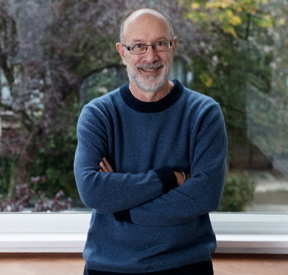 Photo credit Belle AncellWinston, who is the director of the Centre for Dialogue at Simon Fraser University and a professor in the department of biological sciences, will be in Winnipeg for an event celebrating his GG win hosted by the Winnipeg International Writers Festival, Feb. 29 at 7:30 p.m. at the Winnipeg Art Gallery. Joining him will be visual artist Aganetha Dyck.
Photo credit Belle AncellWinston, who is the director of the Centre for Dialogue at Simon Fraser University and a professor in the department of biological sciences, will be in Winnipeg for an event celebrating his GG win hosted by the Winnipeg International Writers Festival, Feb. 29 at 7:30 p.m. at the Winnipeg Art Gallery. Joining him will be visual artist Aganetha Dyck.
Winston took the time to speak to Ariel Gordon.
AG: What do you want people to know about Bee Time?
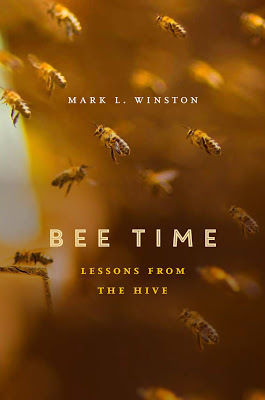 MW: Bee Time is about more than bees, reflecting on the lessons we as humans can learn from the extraordinary communication abilities, collaborative capacities and mutually beneficial interactions with nature that characterize our species at our best, but are too often not expressed in how we deal with each other and interact with the environment around us.
MW: Bee Time is about more than bees, reflecting on the lessons we as humans can learn from the extraordinary communication abilities, collaborative capacities and mutually beneficial interactions with nature that characterize our species at our best, but are too often not expressed in how we deal with each other and interact with the environment around us.
AG: Now that you’ve written six books, what have you learned about writing? What have you learned about your own process?
MW: Good writing is about clear thinking, simple ideas expressed with passion and clarity, and perhaps mostly about telling a story. As to process, my other books were written early in the morning, at home, usually for a few hours beginning at 5 a.m. until I needed to move on to my professor responsibilities. Bee Time was different, written mostly in the waning hours of afternoons, at coffee shops. Perhaps the social nature of coffee shops was a more appropriate setting for this book than being solitary at home, or maybe it was a switch to decaf, but the Bee Time process seemed to fit this book better than the early-morning alone hours.
AG: You’re an academic who writes trade books and regularly gives lectures. Do you ever find it difficult to move between your roles: researcher, writer, communicator and pundit? Or is it just a matter of shifting the language you use, depending on whom you’re addressing that day?
MW: Oddly, I have no difficulty transitioning between these very different cultures. It’s something else I’ve learned from bees, how to be present in the moment, and I adapt easily to what’s going on around me by slowing down and responding to the environment I’m in. And I find the same personal qualities work well in all of these diverse environments, being clear, brief, passionate and interactive.
AG: You’re known as one of the world’s leading experts on bees and pollination. What do you think is the most pressing issue facing bees these days?
MW: Agriculture. If there’s one overriding reason bees are dying, it’s how we farm, and our heavy dependence on pesticides coupled with vast monocropped acreages with insufficiently diverse flowers for honeybees and wild bees to thrive.
AG: If people want to help bees to survive climate change and environmental degradation, what can they do?
MW: There’s quite a bit that each of us can do. First, if you must have a lawn, don’t mow it so often, and let dandelions and clover bloom, both excellent bee forage. Reduce or eliminate use of pesticides around the yard, especially if you have a garden or a larger farm. Leave some wild areas in your yard for wild bees to nest in, particularly areas of bare soil and brush piles. And in Winnipeg there’s a big one: advocate strongly to eliminate spraying against mosquitoes. It’s an ecological tsunami for bees, and from the evidence I’ve seen is barely effective, if at all.
AG: The City of Winnipeg has just voted to allow beehives downtown. Any advice on how to coexist with beehives in urban spaces?
MW: Honeybee colonies are generally pretty easy to coexist with, and require very little space. Even an apartment balcony can be home to a colony. Coexisting mostly involves appreciation, recognizing that honeybees are highly beneficial, and living with them in our midst requires very little adjustment for the very large rewards of urban pollination and honey production. Many cities have developed bylaws that Winnipeg could use as models, but it’s the rare city today that isn’t actively encouraging urban beekeeping. It’s also an essential element in the bigger movement of urban farming and local food production.
AG: What are you reading right now? What are you writing right now?
MW: I just finished Elizabeth Strout’s book My Name is Lucy Barton, and found it exquisite. Richard Wright’s memoir about writing, A Life with Words, is another excellent read, and Paul Kalanithi’s book When Breath Becomes Air is simply stunning. What am I writing? Mostly occasional posts to my blog (winstonhive.com). I’m beginning to reflect on a larger project, either a magazine piece or perhaps another book, focused on ecological farming, and why we farm the way we do, but that project is only in it’s very early stages. My mind, and energy, are still very much on ‘bee time’ for the moment, though.
Ariel Gordon is a Winnipeg writer.
By Ariel Gordon
Vancouver-based Mark L. Winston won the 2015 Governor General’s Award for Non-fiction for his sixth book, Bee Time: Lessons from the Hive.
 Photo credit Belle AncellWinston, who is the director of the Centre for Dialogue at Simon Fraser University and a professor in the department of biological sciences, will be in Winnipeg for an event celebrating his GG win hosted by the Winnipeg International Writers Festival, Feb. 29 at 7:30 p.m. at the Winnipeg Art Gallery. Joining him will be visual artist Aganetha Dyck.
Photo credit Belle AncellWinston, who is the director of the Centre for Dialogue at Simon Fraser University and a professor in the department of biological sciences, will be in Winnipeg for an event celebrating his GG win hosted by the Winnipeg International Writers Festival, Feb. 29 at 7:30 p.m. at the Winnipeg Art Gallery. Joining him will be visual artist Aganetha Dyck.Winston took the time to speak to Ariel Gordon.
AG: What do you want people to know about Bee Time?
 MW: Bee Time is about more than bees, reflecting on the lessons we as humans can learn from the extraordinary communication abilities, collaborative capacities and mutually beneficial interactions with nature that characterize our species at our best, but are too often not expressed in how we deal with each other and interact with the environment around us.
MW: Bee Time is about more than bees, reflecting on the lessons we as humans can learn from the extraordinary communication abilities, collaborative capacities and mutually beneficial interactions with nature that characterize our species at our best, but are too often not expressed in how we deal with each other and interact with the environment around us.AG: Now that you’ve written six books, what have you learned about writing? What have you learned about your own process?
MW: Good writing is about clear thinking, simple ideas expressed with passion and clarity, and perhaps mostly about telling a story. As to process, my other books were written early in the morning, at home, usually for a few hours beginning at 5 a.m. until I needed to move on to my professor responsibilities. Bee Time was different, written mostly in the waning hours of afternoons, at coffee shops. Perhaps the social nature of coffee shops was a more appropriate setting for this book than being solitary at home, or maybe it was a switch to decaf, but the Bee Time process seemed to fit this book better than the early-morning alone hours.
AG: You’re an academic who writes trade books and regularly gives lectures. Do you ever find it difficult to move between your roles: researcher, writer, communicator and pundit? Or is it just a matter of shifting the language you use, depending on whom you’re addressing that day?
MW: Oddly, I have no difficulty transitioning between these very different cultures. It’s something else I’ve learned from bees, how to be present in the moment, and I adapt easily to what’s going on around me by slowing down and responding to the environment I’m in. And I find the same personal qualities work well in all of these diverse environments, being clear, brief, passionate and interactive.
AG: You’re known as one of the world’s leading experts on bees and pollination. What do you think is the most pressing issue facing bees these days?
MW: Agriculture. If there’s one overriding reason bees are dying, it’s how we farm, and our heavy dependence on pesticides coupled with vast monocropped acreages with insufficiently diverse flowers for honeybees and wild bees to thrive.
AG: If people want to help bees to survive climate change and environmental degradation, what can they do?
MW: There’s quite a bit that each of us can do. First, if you must have a lawn, don’t mow it so often, and let dandelions and clover bloom, both excellent bee forage. Reduce or eliminate use of pesticides around the yard, especially if you have a garden or a larger farm. Leave some wild areas in your yard for wild bees to nest in, particularly areas of bare soil and brush piles. And in Winnipeg there’s a big one: advocate strongly to eliminate spraying against mosquitoes. It’s an ecological tsunami for bees, and from the evidence I’ve seen is barely effective, if at all.
AG: The City of Winnipeg has just voted to allow beehives downtown. Any advice on how to coexist with beehives in urban spaces?
MW: Honeybee colonies are generally pretty easy to coexist with, and require very little space. Even an apartment balcony can be home to a colony. Coexisting mostly involves appreciation, recognizing that honeybees are highly beneficial, and living with them in our midst requires very little adjustment for the very large rewards of urban pollination and honey production. Many cities have developed bylaws that Winnipeg could use as models, but it’s the rare city today that isn’t actively encouraging urban beekeeping. It’s also an essential element in the bigger movement of urban farming and local food production.
AG: What are you reading right now? What are you writing right now?
MW: I just finished Elizabeth Strout’s book My Name is Lucy Barton, and found it exquisite. Richard Wright’s memoir about writing, A Life with Words, is another excellent read, and Paul Kalanithi’s book When Breath Becomes Air is simply stunning. What am I writing? Mostly occasional posts to my blog (winstonhive.com). I’m beginning to reflect on a larger project, either a magazine piece or perhaps another book, focused on ecological farming, and why we farm the way we do, but that project is only in it’s very early stages. My mind, and energy, are still very much on ‘bee time’ for the moment, though.
Ariel Gordon is a Winnipeg writer.
Published on February 27, 2016 08:22
February 25, 2016
Four books + lion dance ornament.

* * *
For tomorrow's books column on Dahlia Kurtz' program on CJOB, I plan to talk about these four books:
The Evolution of Alice by David Alexander Robertson (Highwater Press)
Shopping Cart Pantheism by Jeanne Randolph (ARP Books)
Bee Time: Lessons from the Hive by Mark L. Winston (Harvard University Press)
A Knock on the Door: The Essential History of Residential Schools by the Truth and Reconciliation Commission of Canada (University of Manitoba Press)
Or, put another way, one novel and three non-fiction books. Four Winnipeg presses and one based in Cambridge, publishing books by two Winnipeggers, one non-resident, and a multi-author government report.
Speaking of which, Shelagh Rogers just blurbed A Knock on the Door:
"A Knock on the Door is a book that I hope every Canadian will read, and read deeply. The transformation of this country begins with acknowledging what happened after that knock on the door. Acknowledging, understanding the implications, and then resolving to do something for positive change. It's right that the TRC Calls to Action are included, for we are all called to action."—Shelagh Rogers, O.C., Honorary Witness to the work of the TRC.
The segment is part of a monthly books column I'm doing, which so far is great fun. You can listen live or check it out after-the-fact here, by selecting February 26 and 2 pm.
Published on February 25, 2016 12:41
February 24, 2016
Co-Laboratory-ing
I spent a couple of hours at GMB Chomichuk's studio tonight as part of his monthly Co-Laboratory.The Co-Lab, as I will henceforth call it, is a space for artists of every stripe to create in the same space. There are several spots for bit paint/drawing collaborations, lots of places to sit, and even models if anyone feels like sketching.
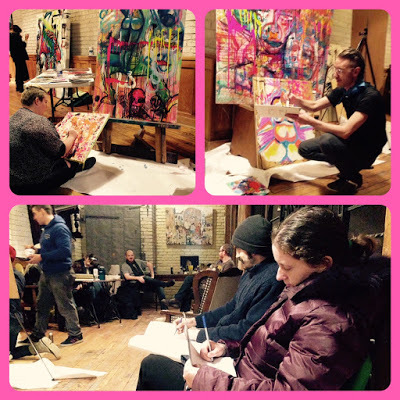 I've been to two sessions. In January, I showed up late, after working all day at UMP and then teaching a 3 hour creative writing class. So I had nothing left, but managed to have some decent conversations with comic book types, including Nicholas Burns and Scott Henderson, whose work I've really admired over the years.
I've been to two sessions. In January, I showed up late, after working all day at UMP and then teaching a 3 hour creative writing class. So I had nothing left, but managed to have some decent conversations with comic book types, including Nicholas Burns and Scott Henderson, whose work I've really admired over the years.
This time, I was feeling burnt out but dragged myself out of the house anyways. I brought my laptop instead of my notebook, mostly because the essay I'm currently working on—about knowing and the body and my time in the Muskwa-Kechika—has been tickling at the back of my head all week.
So: I didn't collaborate with a single person, just plunked myself down and pulled out my laptop, but it was great to be able to work in such noisy quiet. There was music and movement, but everyone was making something, so I was able to sink down underneath it all and do a solid draft of the essay.
Which was enormously satisfying.
It was also great to witness, again, Greg's commitment to the making-of-art. He thinks everyone should make art and everyone should support each other's making-of-art.
Next month, I'm going to try to actually collaborate. Maybe something with a big roll of paper, laid out on the table. People can write lines and sketch things and we'll go from there...
 I've been to two sessions. In January, I showed up late, after working all day at UMP and then teaching a 3 hour creative writing class. So I had nothing left, but managed to have some decent conversations with comic book types, including Nicholas Burns and Scott Henderson, whose work I've really admired over the years.
I've been to two sessions. In January, I showed up late, after working all day at UMP and then teaching a 3 hour creative writing class. So I had nothing left, but managed to have some decent conversations with comic book types, including Nicholas Burns and Scott Henderson, whose work I've really admired over the years.This time, I was feeling burnt out but dragged myself out of the house anyways. I brought my laptop instead of my notebook, mostly because the essay I'm currently working on—about knowing and the body and my time in the Muskwa-Kechika—has been tickling at the back of my head all week.
So: I didn't collaborate with a single person, just plunked myself down and pulled out my laptop, but it was great to be able to work in such noisy quiet. There was music and movement, but everyone was making something, so I was able to sink down underneath it all and do a solid draft of the essay.
Which was enormously satisfying.
It was also great to witness, again, Greg's commitment to the making-of-art. He thinks everyone should make art and everyone should support each other's making-of-art.
Next month, I'm going to try to actually collaborate. Maybe something with a big roll of paper, laid out on the table. People can write lines and sketch things and we'll go from there...
Published on February 24, 2016 19:14



